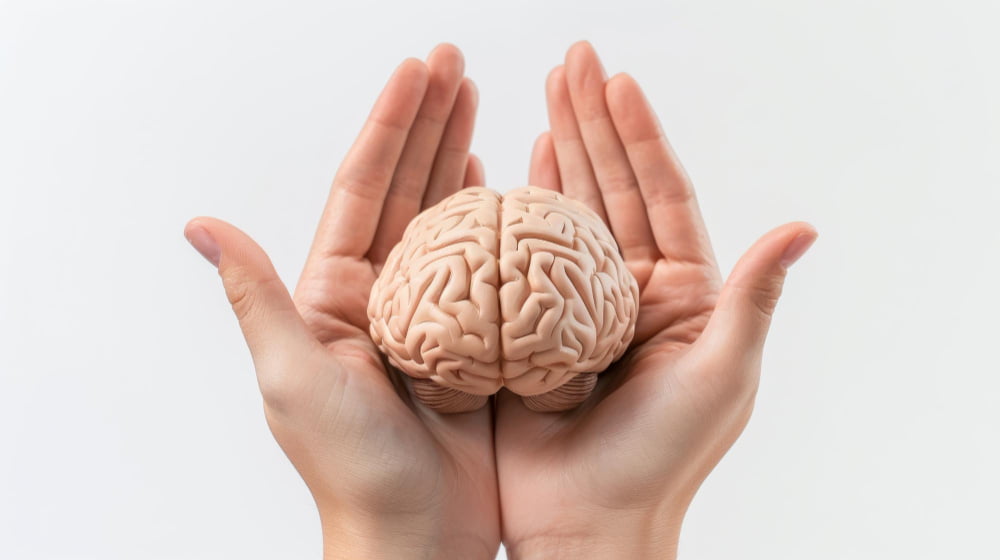Having trouble finding the right word in the midst of a conversation? These are all common problems, but they can also indicate a deeper need: prioritising brain health. Our brain, the body’s control centre, is just as important as our heart and lungs. It thrives, like any other organ, with good care, which begins with what we eat.
This thorough guide digs deep into the topic of brain health, allowing you to make informed decisions that support cognitive performance. We’ll look at the neurological system, which underpins all of our actions and ideas, and discover how blood pressure affects brain health. But who is the star of the show? Food! We’ll look at the science behind the link between diet and brain function, with a focus on the Mediterranean diet as a model for optimal cognitive health.
Demystifying neurological conditions
While occasional memory lapses are common, certain situations provide a greater risk. Let’s take a moment to learn about common neurological diseases including Parkinson’s Disease, which impairs movement and coordination, and Alzheimer’s Disease, a degenerative form of dementia that affects memory, thinking, and behaviour. Early detection and management are critical in treating many disorders and maintaining excellent brain health can be an effective preventive approach.
The foundation: What is the Nervous System?
Our brain is the captain of the ship, yet it does not work in isolation. It is based on a huge network of communication channels known as the nervous system. This sophisticated system serves as the body’s control centre, sending information between the brain, spinal cord, nerves, muscles, and sensory organs. It controls everything we do, from the delicate dance of synchronised motions to the symphony of sensations we feel. When the nervous system functions properly, our bodies work in perfect unison.
Unveiling the importance of Brain Health
Brain health is more than just remembering where you parked your car (though that is also crucial!). It serves as the foundation for a variety of aspects of our health. A healthy brain enables us to think clearly, develop new skills, solve problems successfully, and regulate our emotions. It improves our creativity, productivity, and overall quality of life. Conversely, ignoring brain health can have serious effects. Cognitive decline, memory loss, and an increased risk of neurological illnesses are just a few possible consequences. By focusing on brain health, we invest in our current and future selves, allowing us to live life to the fullest.
Blood pressure and Brain Health: The connection explained
In a healthy situation, blood pressure remains within a normal range. This ensures a smooth flow of resources, nourishing brain cells and enabling them to function optimally.
However, when blood pressure remains consistently high (hypertension), it’s like rush hour traffic on those same highways. The excessive pressure can damage the delicate blood vessel walls over time. This can lead to:
- Narrowed arteries: Think of these as congested roads. Less blood can flow through, limiting the supply of oxygen and nutrients to brain cells.
- Weakened blood vessels: Hypertension can make blood vessels more prone to bursting or leaking, potentially causing strokes. Strokes occur when blood flow to a part of the brain is interrupted, damaging brain tissue.
The consequences of these changes are significant. Restricted blood flow due to hypertension can starve brain cells of the resources they need to function properly. This can lead to:
- Cognitive decline: This refers to a gradual decline in thinking skills like memory, focus, and problem-solving.
- Increased risk of dementia: Dementia is a general term for a decline in cognitive function that interferes with daily life. Hypertension is a major risk factor for Alzheimer’s disease, the most common form of dementia.
The good news is that having a healthy blood pressure is essential for brain health. A healthy lifestyle that includes a balanced diet, frequent exercise, and stress management can greatly reduce your risk of hypertension and cognitive impairment. If you have concerns about your blood pressure, you should see your doctor for frequent monitoring and to discuss treatment options.

Fueling your mind: The impact of diet on Brain Health
Our brain is a busy bee, continuously sending out messages and processing information. To run efficiently, it, like a high-performance engine, requires the proper fuel. This is where diet enters in. Studies have found a strong link between dietary choices and cognitive function. A diet high in brain-boosting foods can improve memory and focus while also lowering the risk of acquiring neurological illnesses. In contrast, a diet strong in processed foods, saturated fats, and added sugars can be bad for your brain.
Mediterranean Diet: A blueprint for Brain Health
Looking for an eating strategy to help your brain? Look no further than the Mediterranean Diet. This dietary pattern, which includes fruits, vegetables, whole grains, fish, olive oil, and nuts, has been associated to a variety of health advantages, including better cognitive performance. The abundance of antioxidants in fruits and vegetables aids in the fight against damaging free radicals that can damage brain cells, while the beneficial fats contained in fish and olive oil help to maintain brain tissue health and flexibility.
Exercise: Not just for the body, but for the brain too
We all know that exercise is important for our physical health, but did you realise that it is also healthy for our brains? Regular physical activity improves memory, focus, and mood. Exercise boosts blood flow to the brain, supplying necessary nutrients and oxygen to support cognitive function. Furthermore, it stimulates the formation of new brain cells and improves existing connections, resulting in sharper thinking and greater cognitive flexibility.
Cultivating healthy habits for a vibrant brain
Just like a garden, your brain thrives with consistent care. Beyond diet and exercise, incorporating healthy habits into your daily routine is essential for optimal brain health. Here are some key lifestyle practices to consider:
- Regular Sleep: Aim for 7-8 hours of quality sleep each night. Sleep allows your brain to consolidate memories, process information, and remove waste products that can impair cognitive function.
- Stress Management: Chronic stress can wreak havoc on your brain. Explore relaxation techniques like meditation, yoga, or deep breathing to manage stress effectively.
- Mental Stimulation: Keep your brain challenged! Engage in activities that stimulate your mind, like learning a new skill, playing brain games, or reading challenging books.
- Social Engagement: Social interaction is vital for brain health. Connect with loved ones, join a club, or volunteer in your community.
Prioritizing Brain Health: Strategies for improvement
Taking charge of your brain health is empowering.
Here are some practical strategies you can implement right away:
- Cognitive Exercises: Regularly engage in brain-training exercises that target memory, focus, and problem-solving skills. Many online resources and mobile apps offer brain-training exercises.
- Mindfulness Practices: Mindfulness meditation can improve focus, attention, and emotional regulation. There are numerous guided meditations available online or through apps.
- Lifelong Learning: Never stop learning! Challenge yourself by taking a class, learning a new language, or simply picking up a new hobby that keeps your mind active.
Assessing Brain Health: Tools and Techniques
Staying informed about your brain health allows you to take proactive steps towards improvement.
Here are some methods for assessing your cognitive function:
- Cognitive Assessments: These formal tests are administered by healthcare professionals to evaluate memory, attention, and problem-solving skills.
- Brain Imaging: Techniques like MRI scans can provide detailed images of the brain, helping to identify potential problems.
- Self-Assessment Tools: Numerous online self-assessment tools can provide a general sense of your cognitive function. Remember, these
these tools are not a substitute for professional evaluation. They can, however, be a starting point for monitoring your cognitive function over time.
Testing Brain Health at home: DIY Methods
While formal assessments are valuable, there are also ways to gauge your brain health at home.
Here are some DIY methods:
- Memory Tests: Online memory tests can assess your ability to recall information.
- Cognitive Games: Regularly playing brain-training games can be a fun way to stimulate your cognitive function and track your progress over time.
- Lifestyle Assessments: Reflect on your sleep patterns, stress levels, and overall lifestyle habits. Are there areas where you can make improvements to support brain health?
Choosing the right test for Brain Health
Maintaining brain health is an ongoing process, and it can be beneficial to check in periodically to see how you’re doing. There are several brain health assessments available, but with so many possibilities, it can be difficult to choose the proper one.
Here’s a guide to navigating the maze of brain health assessments, ensuring you select the most suitable test for your unique needs:
The appropriate brain health assessment depends on several factors:
- Age: As we age, cognitive function naturally declines. Baseline assessments in your younger years can be helpful for comparison later in life.
- Risk Factors: If you have a family history of neurological conditions or experience concerning symptoms, a healthcare professional can recommend the most suitable assessment.
- Specific Concerns: Are you experiencing memory lapses, difficulty concentrating, or changes in mood? Discussing these concerns with your doctor can guide the choice of assessment.
Sharpening your cognitive edge: Strategies for brain enhancement
The good news is that brain health is not static. Here are some strategies to keep your cognitive function sharp:
- Dietary Changes: Prioritize brain-boosting foods like fruits, vegetables, nuts, whole grains, and fish. Limit processed foods, saturated fats, and added sugars.
- Mental Exercises: Regularly engage in activities that challenge your brain, such as puzzles, crosswords, or learning a new language.
- Stress Management: Chronic stress can impair cognitive function. Practice relaxation techniques like meditation or deep breathing to keep stress levels in check.
Nourishing your Brain: Foods that fuel cognitive function
To function efficiently, your brain needs specialised nutrients, much as a high-performance engine does. These nutrients promote memory, attention, and overall cognitive function. This is when the diet comes into play! By eating a range of brain-nourishing foods, you can improve your cognitive health and keep your mental engine working smoothly.
Let’s go into the details: these are the crucial foods to prioritise for a sharper mind.
- Fruits: Rich in antioxidants and essential vitamins, fruits like berries, citrus fruits, and leafy greens help protect brain cells from damage.
- Vegetables: Colourful vegetables like broccoli, spinach, and carrots provide essential nutrients that support cognitive function.
- Nuts: Almonds, walnuts, and other nuts are packed with healthy fats, vitamin E, and antioxidants, all beneficial for brain health.
- Omega-3 Fatty Acids: Fatty fish like salmon, tuna, and sardines are excellent sources of omega-3 fatty acids, crucial for maintaining healthy brain function.
- Whole Grains: Whole grains like brown rice, quinoa, and oats provide sustained energy for your brain and promote cognitive flexibility.
Daily Brain Workouts: Simple practices for everyday enhancement
Brain training doesn’t have to be complicated.
Here are some easy-to-implant practices to boost your cognitive function daily:
- Learn a New Word: Challenge yourself to learn a new word every day. This keeps your brain engaged and expands your vocabulary.
- Switch Up Your Routine: Break out of your comfort zone by taking a different route to work, trying a new recipe, or reading a book on an unfamiliar topic. Novelty stimulates new brain cell connections.
- Engage in Active Listening: When conversing with someone, actively listen by paying close attention and summarising what you hear. This improves focus and memory recall.
- Juggle Multiple Tasks (Safely): While multitasking can be overwhelming, occasionally engaging in safe, low-stakes multitasking activities can enhance cognitive flexibility. Think about folding laundry while listening to an audiobook.
Exploring Brain Diseases: Understanding the Risks
Knowledge is power. Let’s explore some common brain diseases:
- Alzheimer’s Disease: A progressive neurodegenerative disease that affects memory, thinking, and behaviour. Early detection and management are crucial.
- Parkinson’s Disease: A neurodegenerative disorder that affects movement and coordination. Symptoms may include tremors, stiffness, and balance problems.
- Stroke: A sudden interruption of blood flow to the brain, causing brain cell damage. Symptoms can vary depending on the affected area of the brain.
Unravelling Complexity: What Causes Brain Problems?
Although the human brain is a marvel of complexity, it is not without flaws. While some may blame age-related decline, the truth is that brain issues can result from a variety of causes. Understanding these different factors enables us to make proactive efforts to protect our cognitive health. Let’s untangle the complex network of reasons that can lead to brain problems:
Brain problems can arise from various factors, including:
- Genetics: Some brain diseases have a genetic predisposition.
- Lifestyle Factors: Poor diet, lack of exercise, and chronic stress can contribute to cognitive decline.
- Environmental Influences: Exposure to toxins or environmental hazards can increase the risk of brain problems.
- Underlying Health Conditions: High blood pressure, diabetes, and sleep disorders can impact brain health.

Addressing Slow Brain Function: Strategies for Improvement
Do you ever feel like your brain is travelling through mud? It might be difficult to have trouble remembering names, lose attention mid-task, or think slowly. The good news is that cognitive function is not fixed in stone. Implementing some targeted tactics will help you sharpen your mental edge and enjoy a notable increase in brainpower.
Here are some helpful techniques for addressing poor brain function and getting your cognitive cogs running smoothly again:
- Consult Your Doctor: Discuss your concerns with your doctor. They can assess your overall health and rule out any underlying medical conditions that might be contributing to slow brain function.
- Lifestyle Modifications: Prioritise a healthy diet, regular exercise, and adequate sleep. These lifestyle changes can significantly improve cognitive function.
- Cognitive Exercises: Regularly engage in brain-training exercises to stimulate new brain cell connections and improve cognitive flexibility.
- Medical Interventions: In some cases, medication or other medical interventions may be necessary to address specific causes of slow brain function.
Conclusion: Empowering Your Brain Health Journey
Just like every other facet of your well-being, brain health demands regular effort and attention. By implementing the practices suggested in this guide, you can begin a journey of empowered brain health. Remember that the brain is extremely adaptive; you have the ability to increase cognitive performance and maintain mental sharpness throughout your lifetime. So, embrace a brain-healthy lifestyle, eat nutritious foods, and keep your cognitive engine working smoothly!
Frequently Asked Questions
A: Think colourful and fatty! Pack your plate with fatty fish (salmon, tuna), berries, nuts (almonds, walnuts), and leafy greens (spinach, kale). These foods are loaded with omega-3s, antioxidants, and healthy fats that nourish your brain.
A: Your brain needs the right fuel to function at its best. A healthy diet rich in brain-boosting nutrients supports memory, focus, and overall cognitive function. Conversely, processed foods, saturated fats, and added sugars can hinder your brainpower.
A: Exercise your body and mind! Regular physical activity increases blood flow to the brain, while activities like learning a new language or playing brain games keep your brain challenged and promote cognitive flexibility. Don’t forget quality sleep (7-8 hours) and stress management techniques like meditation or deep breathing – a well-rested and relaxed brain is a happy brain!
A: There are online memory tests and brain training games you can try, but these are not substitutes for professional evaluation. If you’re concerned about your cognitive function, discuss it with your doctor. They can assess your overall health and recommend appropriate tests.
A: Brain problems can arise from various factors, including:
Genetics: Some brain diseases have a hereditary component.
Lifestyle: Poor diet, lack of exercise, and chronic stress can contribute to cognitive decline.
Environmental factors: Exposure to toxins or environmental hazards can increase the risk of brain problems.
Underlying health conditions: High blood pressure, diabetes, and sleep disorders can impact brain health.
A: Feeling foggy can be frustrating! Here are some steps to sharpen your cognitive edge:
Consult your doctor: Rule out any underlying medical conditions.
Prioritize healthy habits: Eat a balanced diet, exercise regularly, and aim for quality sleep.
Engage your brain: Challenge yourself with brain-training exercises, puzzles, or learning a new skill.
A: Early detection is crucial. Here are some signs to watch for:
Increased forgetfulness or memory lapses
Difficulty concentrating or focusing
Changes in mood or behavior
Problems with language or communication
Loss of coordination or balance




